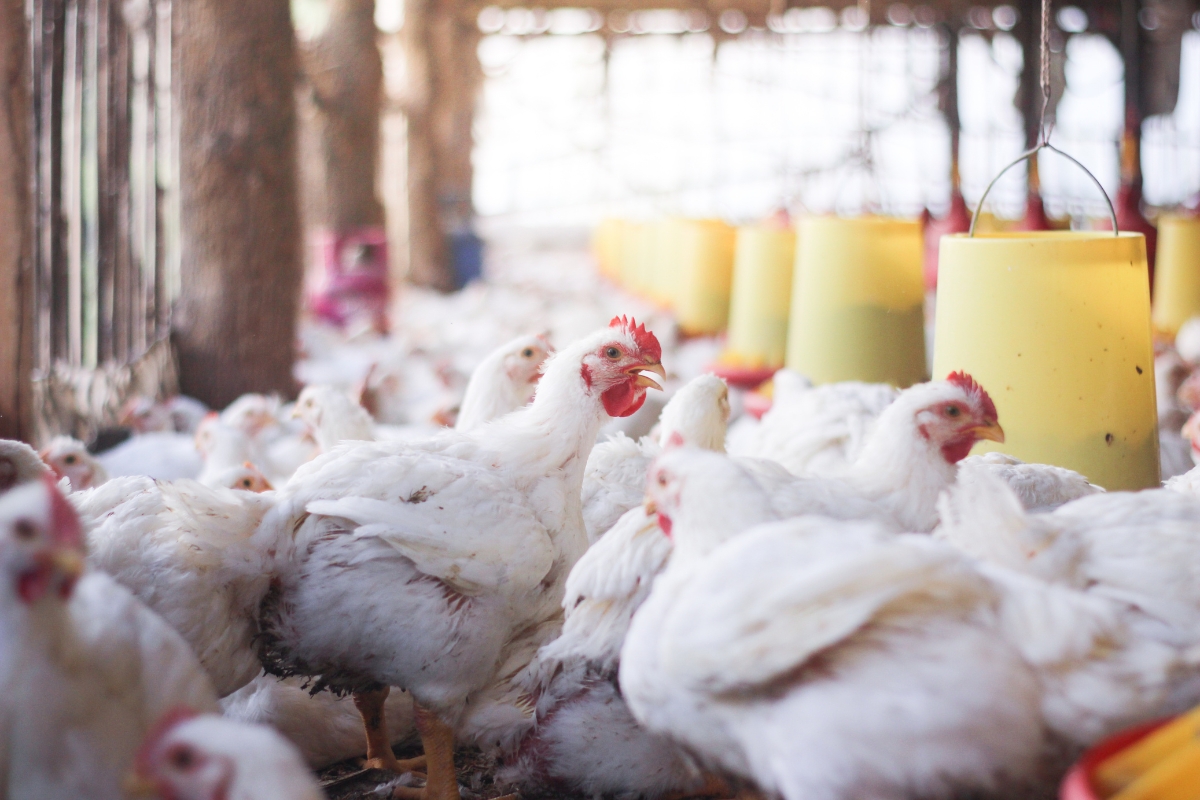Salmonella phages
Bacteriophages, or phages, are viruses that can infect and kill bacteria. They have been proposed as a way to control zoonotic bacteria in poultry production, but more research is needed to understand their effects on the gut.
This study examined the interaction of Salmonella phages with broilers by comparing the caecum microbiome and metabolome after a Salmonella phage challenge. The phages were administered via drinking water or feed for 24 hours to 4-6 week old broilers. High-throughput sequencing of the 16S rRNA gene showed a high level of similarity between the phage-treated and control groups, but a significant change in alpha diversity between those treated with phages in the drinking water and control.
The phages affected only a few genera of the microbiota’s structure, but significantly impacted their metabolites, regardless of the administration route. This study shows that preventive therapy with bacteriophages minimally alters the caecal microbiota but significantly impacts their metabolites.
One of the main concerns with using phages to control zoonotic bacteria is the potential for negative effects on the gut ecology. This study aimed to evaluate the impact of Salmonella phages on the caecal microbiota and metabolome of Salmonella-free broilers. The phages were administered via drinking water or feed for 24 hours to 4-6 week old broilers. High-throughput sequencing of the 16S rRNA gene revealed a significant change in alpha diversity between those treated with phages in the drinking water and control.
However, the phages affected only a few genera of the microbiota’s structure, regardless of the administration route. Among these, there were significant increases in Streptococcus and Sellimonas in the drinking water group and Lactobacillus, Anaeroplasma and Clostridia_vadinBB60_group in the feed group.
The results of this study also showed that the phages significantly impacted the metabolites of the broilers, regardless of the administration route. A substantial number of metabolites were significantly altered, especially in the phage administered in the drinking water. These findings suggest that while bacteriophage therapy may have minimal effects on the structure of the caecal microbiota, it can significantly alter its metabolites.
Overall, this study demonstrates the potential of bacteriophages as a tool for controlling zoonotic bacteria in poultry production. However, more research is needed to fully understand their impact on the gut and ensure their safe and effective use.
The authors Laura Lorenzo-Rebenaque, Cristina Casto-Rebollo, Gianfranco Diretto, Sarah Frusciante, Juan Carlos Rodríguez, María-Paz Ventero, Carmen Molina-Pardines, Santiago Vega, Clara Marin, and Francisco Marco-Jiménez published their findings in the article ‘Examining the effects of Salmonella phage on the caecal microbiota and metabolome features in Salmonella-free broilers‘, dated 10 November 2022.
Key topics include:
- Bacteriophages (phages) are viruses that can infect and kill bacteria and have been proposed as a way to control zoonotic bacteria in poultry production.
- This study aimed to investigate the interaction of phages with animals by comparing the caecum microbiome and metabolome after a Salmonella phage challenge in Salmonella-free broilers.
- The phages were administered via drinking water or feed to 4-6 week old broilers for 24 hours.
- High-throughput sequencing of the 16S rRNA gene showed a significant change in alpha diversity between those treated with phages in the drinking water and control.
- The phages affected only a few genera of the microbiota’s structure, regardless of the administration route.
- The phages significantly impacted the metabolites of the broilers, especially in the phage administered in the drinking water.
- Bacteriophage therapy may have minimal effects on the structure of the caecal microbiota but can significantly alter its metabolites.

Abstract
Bacteriophages selectively infect and kill their target bacterial host, being a promising approach to controlling zoonotic bacteria in poultry production.
To ensure confidence in its use, fundamental questions of safety and toxicity monitoring of phage therapy should be raised.
Due to its high specificity, a minimal impact on the gut ecology is expected; however, more in-depth research into key parameters that influence the success of phage interventions has been needed to reach a consensus on the impact of bacteriophage therapy in the gut.
In this context, this study aimed to investigate the interaction of phages with animals; more specifically, we compared the caecum microbiome and metabolome after a Salmonella phage challenge in Salmonella-free broilers, evaluating the role of the phage administration route.
To this end, we employed 45 caecum content samples from a previous study where Salmonella phages were administered via drinking water or feed for 24 h from 4, 5 to 6-weeks-old broilers.
High-throughput 16S rRNA gene sequencing showed a high level of similarity (beta diversity) but revealed a significant change in alpha diversity between broilers with Salmonella-phage administered in the drinking water and control.
Our results showed that the phages affected only a few genera of the microbiota’s structure, regardless of the administration route.
Among these, we found a significant increase in Streptococcus and Sellimonas in the drinking water and Lactobacillus, Anaeroplasma and Clostridia_vadinBB60_group in the feed.
Nevertheless, the LC-HRMS-based metabolomics analyses revealed that despite few genera were significantly affected, a substantial number of metabolites, especially in the phage administered in the drinking water were significantly altered (64 and 14 in the drinking water and feed groups, respectively).
Overall, our study shows that preventive therapy with bacteriophages minimally alters the caecal microbiota but significantly impacts their metabolites, regardless of the route of administration.
Keywords: bacteriophages; high throughput sequencing; microbiome; omic sciences; poultry.
Copyright © 2022 Lorenzo-Rebenaque, Casto-Rebollo, Diretto, Frusciante, Rodríguez, Ventero, Molina-Pardines, Vega, Marin and Marco-Jiménez.

 Oral Administration of a Phage Cocktail to Reduce Salmonella Colonization in Broiler Gastrointestinal Tract – A Pilot Study
Oral Administration of a Phage Cocktail to Reduce Salmonella Colonization in Broiler Gastrointestinal Tract – A Pilot Study
